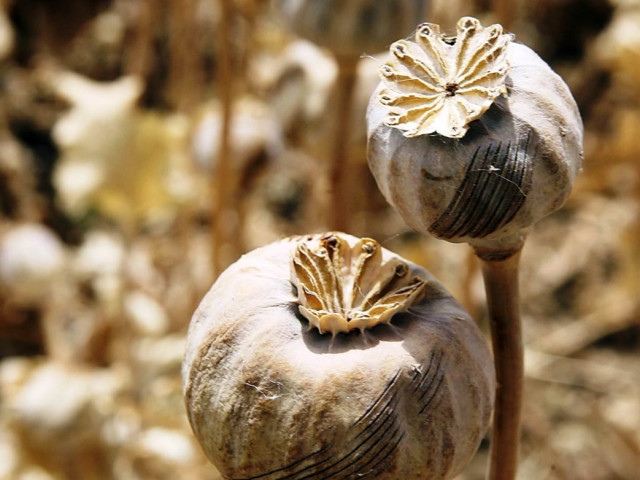Ultimatum: Destroy crop or face action, police warn poppy growers
Farmers justify cultivating banned crops by saying the government did not honour its promise.

District police officer (DPO)Kohistan Abdul Majeed Afridi warned farmers to destroy poppy and marijuana plants within the next couple of weeks if they want to avoid action.
Afridi was speaking to newsmen at his office. He has been posted as DPO in Kohistan in place of Ilyas Khan, following the sectarian murder of 19 Shias on the Karakoram Highway last month.
“It’s true that a number of Kohistani farmers have cultivated poppy and marijuana in Pattan tehsil and Kundiya valley,” said Afridi. “Since they were sown late, the plants are small and can be destroyed easily.”
An official source in the revenue department also confirmed that villagers sowed poppy and marijuana in hilly areas which surfaced after the snow melted.
Afridi disclosed that when he was DSP in Kohistan in 2005, he carried out an operation in the area to destroy poppy and marijuana.
“I will be compelled to destroy the banned crop by force because I have to ensure the writ of the state and clear the area,” said the DPO.
“I have already conveyed the message to farmers to go for voluntary destruction through tribal elders,” he added.
The farmers advanced their justifications for cultivating banned crops when approached for comments.
“When the government destroyed our crops in 2005, it promised to pay compensation and carry out development in our area. The government did not honour its promise,” said a poppy farmer, requesting his name be withheld.
“Only influential farmers received compensation while the majority of poor farmers were ignored by the government in 2005,” he added.
Afridi confirmed that most poppy farmers who were promised incentives were not even compensated by the government.
Another farmer said the majority of farmers grow banned crops because they are very profitable and they have no other source of income.
“The government and political leaders are least interested in addressing our issues. “There are no job opportunities, no sources of livelihood except growing poppy or marijuana and felling trees from the forest,” he added.
Kohistan is one of the poorest districts of Khyber-Pakhtunkhwa and most areas can only be accessed on foot due to the hilly terrain.
In July 2010, a heavy spell of monsoon rain killed 179 villagers and injured 1650 people. Some 2217 houses were completely damaged, while 2956 were partially destroyed, displacing 36215 persons.
Shops were damaged and over 4500 cattle heads perished, depriving a large number of villagers of not only an income but their means of sustenance.
Last year, Kundiya valley also witnessed another disaster when three villages were completely washed away by flash floods killing several villagers. The infrastructure destroyed has not been rehabilitated to date.
Published in The Express Tribune, April 22nd, 2012.



















COMMENTS
Comments are moderated and generally will be posted if they are on-topic and not abusive.
For more information, please see our Comments FAQ